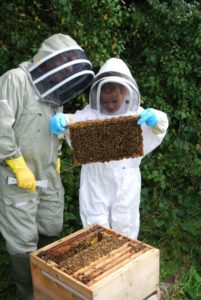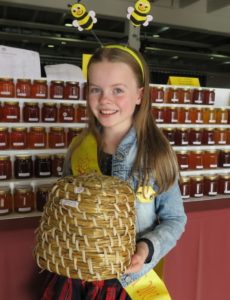 Honeybees are, quite rightly, in the news a lot these days. Their rapid decline has been widely reported, with challenges including disease, pesticides, the varroa mite and loss of habitat – in towns and cities as much as on farmland.
Honeybees are, quite rightly, in the news a lot these days. Their rapid decline has been widely reported, with challenges including disease, pesticides, the varroa mite and loss of habitat – in towns and cities as much as on farmland.
To help address this worrying trend, the Royal Bath & West Society is encouraging people to get involved with caring for these essential and industrious pollinators.
“Bees are a vital part of our farmed landscape – without pollinators arable yields would suffer, and fruit trees would fail to produce fruit,” says Rupert Cox, chief executive of the Society. “They are essential to our food security, as well as being fascinating creatures to study, whether that’s in the hive or simply on your garden flowers.”
Fortunately, beekeepers have grown enormously in numbers over the past decade, with 247,000 hives recorded in 2017, compared to fewer than 80,000 in 2008. But more needs to be done, and the Society is urging people to get involved, whether by learning to keep bees themselves or simply choosing bee-friendly plants for their gardens.
“The popular Bees and Honey area at the Royal Bath & West Show is the perfect place to learn more about these incredible insects,” says Mr Cox. “Come along and see how a hive works, how honey is extracted, and what plants are most attractive to honeybees. Regardless of whether you live in a city or the country, there is something every one of us can do to help protect and revive this important species.”
One such champion of bees is 11-year-old Rosie Boyd, who has been involved with beekeeping since she was two, having been introduced to the craft by her father Angus. She now has her own hive, which has become the biggest in the apiary, and has won a plethora of national honey awards, including the prestigious Snelgrove Shield Trophy at the Bath & West Show three years’ running.

“If we didn’t have any bees then humans would only have four years left to live on the planet,” says Miss Boyd. “Looking after bees is one way to help the environment – and the environment isn’t doing that well at the moment.”
So how can people get involved? “At the Bath & West Show there are observation hives so you can see the bees working, and there’s a demonstration area to show the public what to do. You can also do candle rolling and other activities – I like the creative exhibits.”
The British Beekeepers Association (BBKA) website has a list of bee-friendly plants, and members of the public can adopt a beehive, with money going towards education and training, she adds. “There may be a beekeeping club at school – or you could start one up – and the BBKA has local branches so you can go along to the local club apiary.”
Next year, Miss Boyd plans to attend the International Meeting of Young Beekeepers in Slovenia, and has already passed the required exams with top honours. “There will be three candidates from England and you’re put into teams with other nationalities.
“The competition consists of some practical tests as well as checking your knowledge, perhaps identifying diseases in the hive, knowing how to create a nucleus to stop bees swarming and understanding queen breeding: It’s quite tricky but I’m really looking forward to it.”
Rosie’s top bee tips
- If you see a bee, stay calm – they only sting if they feel threatened by you.
- If you are working on a beehive, wear protective gear and make sure your veil is zipped up.
- Plant bee-friendly flowers: It doesn’t sound much but it really helps.
- Join a local beekeeping club.
- Enter competitions – you can do lots of classes without even keeping bees.
- Use a smoker when handling bees, but beware of the fire risk.
- If you’re stung, don’t squeeze the sac as it injects more venom – flick it off.
- Know the difference between an Asian and European Hornet – the former can kill whole beehives so report any sightings to the Centre for Ecology and Hydrology. Download the ‘Asian Hornet Watch’ app for identification tips and to report sightings.
- Enjoy what you see – it’s not every day you get to see bees in the hive.
Saving the bumblebee
Quilter Cheviot Investment Management and the Bumblebee Conservation Trust will be hosting a talk at the Bath & West Show on saving a rare bumblebee in the Somerset area, to which visitors are welcome. The talk, by Daisy Headley, conservation officer at the Bumblebee Conservation Trust, will be held at 12.30 on Wednesday 29 May at the Quilter Cheviot tent, stand 141.
- The Royal Bath & West Show will be held on 29 May – 1 June. Tickets are available from the website: bathandwest.com or by calling 0844 776 6777. Children – for the first time – can go free during the May half term, with a £3 discount on early adult bookings.




